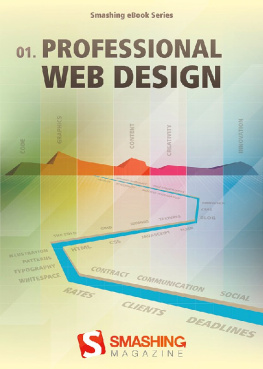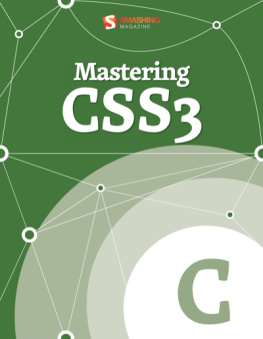
Table of Contents
Preface
Being a great web designer or developer is one thing running a successful freelance business another. Whether you already have work experience in companies or you've just graduated from design school: Being self-employed entails a number of tasks you most likely didn't have to deal with so far. As a freelance web designer you also have to be a project manager, office administrator, accountant, controller and IT expert.
Juggling all of these, among most designers not exactly popular, tasks while conceiving creative ideas and producing splendid websites, can be very arduous. To help you with this feat we have compiled 21 selected (+2 new) articles about successfull freelancing that have been published on Smashing Magazine and Noupe in 2009 and 2010 offering you invaluable tips and guidelines from professionals in web design. The focus lies on communicating with clients and co-workers, including marketing strategies and pitching, as this tends to be most problematic for freelance web designers.
We hope this carefully edited and especially illustrated ebook will make you even more successful and helps you master juggling. Sven Lennartz, Vitaly Friedman, Manuela Mller
Imprint
Published in June/2010
Smashing Media GmbH, Freiburg, Germany
Book Cover Design: Andrea Austoni
Illustrations: Ricardo Gimenes
Proofreading: Manuela Mller
Concept & Editing: Sven Lennartz, Vitaly Friedman

CHAPTER 1: BASIC SKILLS OF FREELANCE WEB DESIGNERS
Essential Habits of An Effective Professional Freelancer
by Rob Smith

Theres very little to stop anyone becoming a freelancer. In a highly competitive and, in most places, saturated market, you need to make sure your reputation as a freelancer is well-managed and continues to grow. Its very possible to get a good reputation without being the best in the world, and its even easier to lose that reputation. In this article, well explore 15 habits that are essential in helping freelancers effectively safeguard and grow their reputation, and well also discuss how to make freelancing work for you.
Marketing and Relationships
1. The Presentation Habit
Your website should be at the centre of your marketing strategy. Its where people go to see who you are, what youre about, whether you know what youre talking about and what work you have done. Its your silent 24/7 salesman, and it needs to be right. Fortunately, what your website needs is straightforward:
Well-presented work with a good description of the roles you played
A brief history of who you are and why youre where you are
Contact details that are easily accessible
Content that is continually tweaked, added to, and updated

Other than that, you can go wherever you want with your own website and so you should. Personality is key . Jason Santa Maria goes the whole hog with a new design for each post a lot of work but he stands out from the crowd as a result
2. The Networking Habit
They say that within 6 degrees of separation, everyone knows everyone. So you need to make sure that everyone within your 1st degree (i.e. people you know), know exactly what you do. It needs to be exact as well. If youre a developer you dont want people saying youre a website designer, and so on. Your current network of friends, family, and associates are your free word-of-mouth marketing so get them talking about you right now.
Once this is done, your network needs to be extended and enhanced. Register with any social networking platforms that can work for you LinkedIn, Facebook, and Twitter. Within those places, start getting into the right circles. On LinkedIn you may join some appropriate discussion groups that are either local or skill based. On Twitter you may start tweeting and including appropriate hashtags so more people can see your tweet on that subject.
There are many ways to network and connect with people, so its crucial that a freelancer not be afraid to talk to people and share information and contacts. Learn the networking habit and get yourself known.
3. The Niching Habit
Freelancers can get into the habit of not only finding their niche, but creating niches. A niche in this case is an area in your overall field of work in which you particularly specialise. If youve become very good at creating websites for golf courses, for example, then thats a great niche.
The reasons having a niche is valuable are simple: Its easier to become an expert in a niche. Its easier to sell to other prospects within that niche as they can see what you have done before. As an expert in that niche you can charge a premium for your depth of knowledge. The key to this habit is to proactively build your own niches. Seek out profitable areas in which you can work and concentrate on building niches.
4. The Pricing Habit
How you price your projects can easily be the difference between winning and not winning some work. Your pricing needs to be transparent at all times and should be agreed upon up front. Things go wrong when hidden costs appear later on. Clients like to know how much theyre paying, when theyre going to pay it, and what theyre paying for. So make it clear from the start.
Second part of the pricing habit protect yourself. Its easy to get so wrapped up in winning a project that you forgot some simple rules. If you have never worked with a client before, ask for a small percentage of the fee before you do any work. At this early stage, you wont know whether they will pay! Reduce your bad debt by either only working for clients you trust or having some remuneration first.
Third part of the pricing habit be flexible. Make sure you find a way to make the commercial deal a win-win for both parties. This could be:
Monthly payments (regular cash flow over the course of the project)
Payment when you hit certain project milestones (e.g. project performance)
Deposit and balance on completion (best avoided for cash flow reasons)
Possible exchange of services
5. The Growth Habit
Its been claimed that it costs seven times as much in resources to acquire a new client than it does to grow an existing one. So the growth habit is about proactively looking at your clients in detail so you can discover new ways to help them.
One practical way to do this is to cross reference. Write all your services across the top of an excel sheet, then put your clients down the left hand column. Now place an X in the box where a service you have done matches a client. The boxes without Xs are potential growth opportunities and should all be explored before spending too much energy trying to acquire new clients.
Business and Time
6. The Time Management Habit
Lacking good habits in time management could cause you to over-committing yourself at certain times, which could lead to:
Next page

















